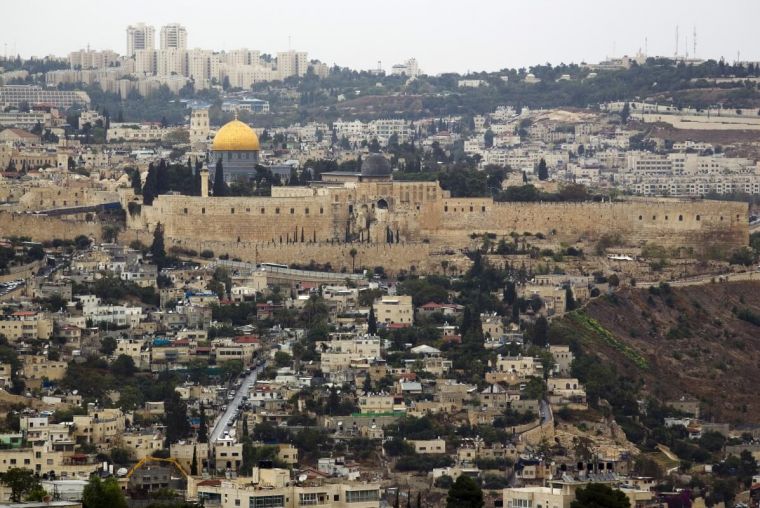Jerusalem Day: Marking the 'reunification' of a tragic, beautiful city

The eternally tragic nature of Jerusalem, the city over which Jesus wept, is perhaps best captivated in the Talmud, the text on Jewish law written in the 2nd century BC.
'Ten measures of beauty gave God to the world: nine to Jerusalem and one to the remainder,' it says, before adding prophetically: 'Ten measures of sorrow gave God to the world: nine to Jerusalem and one to the remainder.'
Today marks Jerusalem Day, or in Hebrew Yom Yerushalayiman, an Israeli national holiday for the celebration of the 'reunification' of Jerusalem and the establishment of Israeli control over the Old City from the Jordanians in the wake of the Six Day War in June 1967.
In May 1968, the government proclaimed the new holiday and in March 1998, the Knesset passed the Jerusalem Day Law, making the day a national holiday.
Though the increasingly secular majority of Israelis largely ignore the day, it is still important to religious Jews in Israel and elsewhere, after the Chief Rabbinate of Israel declared Jerusalem Day a religious holiday to mark the regaining of access to the holy site of the Western Wall.
A theme of Jerusalem Day, based on a verse from the Book of Psalms, is 'Ke'ir shechubra lah yachdav' which means 'Built-up Jerusalem is like a city that was joined together' (Psalm 122:3).
Yet the irony of that is not lost on anyone who has spent time in either the wider area, or in the Old City itself.
For while Israel considers Jerusalem its 'eternal, undivided capital', the Palestinians regard the east of the city – occupied by Israel in the Six Day War – to be the capital of any future Palestinian state.
And in the Old City, home to the Western Wall of the Temple which was liberated for Jewish worship in the Six Day War, the territory is divided between the Jewish, Muslim, Christian and Armenian quarters, with tension frequently flaring in the tiny piece of land that houses both the Western Wall and the Islamic Dome of the Rock.
And that is not even to mention the central importance to Christians of Jerusalem: site of the death and resurrection of Jesus. The Old City may be home to some 80 churches, many hidden away in the mysterious souks, but the Christian presence in the Holy Land is notably quiet compared to that of the two sides of the world's most intractable conflicts.
To some observers, Jerusalem is anything but united, and its fair division, perhaps into a permanent 'international' city, remains key to resolving the question of Israel and the Palestinians, who Donald Trump is trying to bring together in a fresh peace initiative.
Nonetheless, for many Jews today is a great day of celebration. For them, the retaking and the 'reunification' of Jerusalem was the culmination of the vision and dream prayed for by many generations of Jews throughout the ages, as encapsulated by the Psalmists' vision of the return of the captivity of Zion to their rightful home.
As Chief Rabbi Shear Yashuv Cohen said when he was Deputy Mayor of Jerusalem in 1967, at the time of the war: 'Jerusalem, our great, united and perfect city, is not up for division. Even during the biblical era she was never divided among the 12 Tribes of Israel. This is because Jerusalem belong in her entirety to the whole of Klal Israel, to the entire Jewish people.... Jerusalem belongs to us. Every single stone, alley and street belongs to the holy mountain of Zion. And Zion as you know is the heart of our people and nation, the root of our soul.
'Can a heart be divided? You can't subdivide a heart; you cannot form a partnership in a heart, nor slice it in half, thirds or quarters... We have absolutely no right to make any deals whatsoever in the name of so-called "demography", based on whatever temporary ethnic make-up happens to reign in our Holy City.'
And according to the Jewish academic Irene Lancaster, who translated a recently published biography of Chief Rabbi Cohen: 'Jerusalem is the heart, soul and kernel of the Jewish people. She has always been so and always will. For over 2000 years we have prayed towards Jerusalem, wherever we live in the world. At our Pesach Seders, we always end with the fervent prayer, "Next year in Jerusalem, in Jerusalem rebuilt". And now it is.
'Jerusalem represents for us, the Jewish people, both an ideal and a reality. It is both an ancient and a young city. It is fervently to be hoped that in times to come the whole world will recognise the special character and unity of the holy Jewish city of Jerusalem, and come to acknowledge the one God of peace and love encapsulated by her reunified presence in the world. On this her 50th anniversary, let us all give thanks to God for his miracle of the reunification of the city of Jerusalem, the city of love, hope and ultimate peace.'











